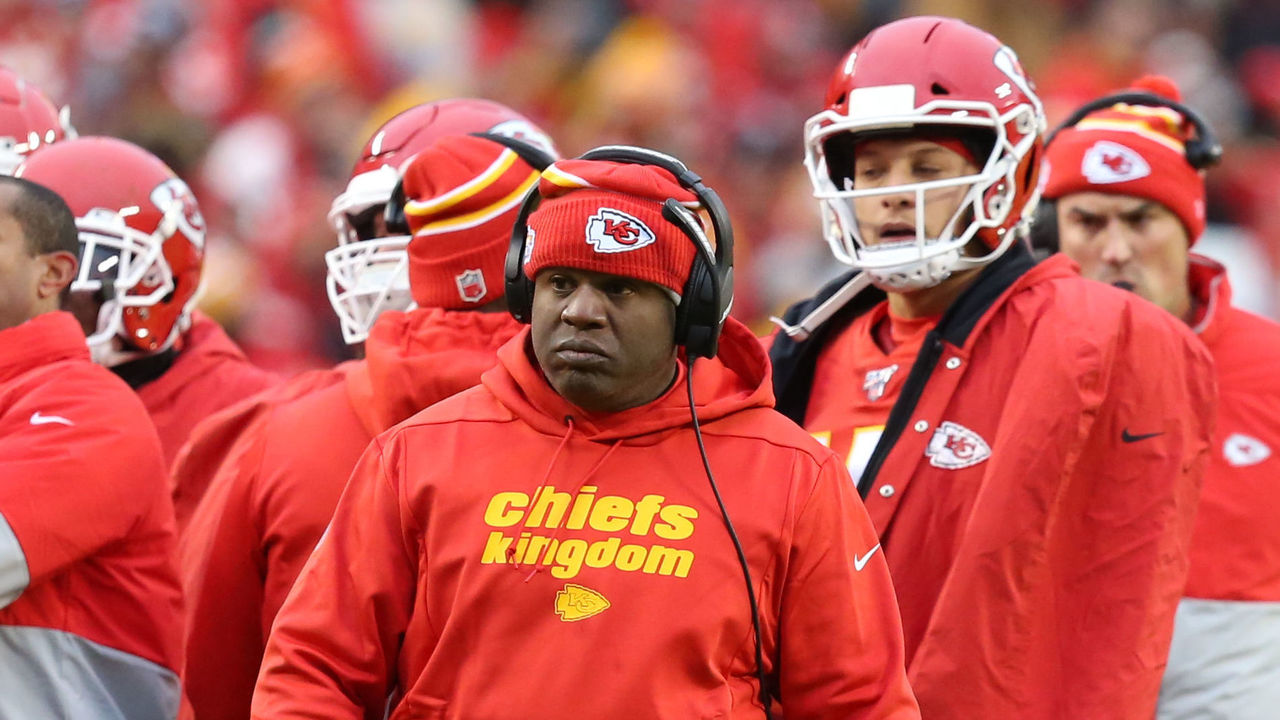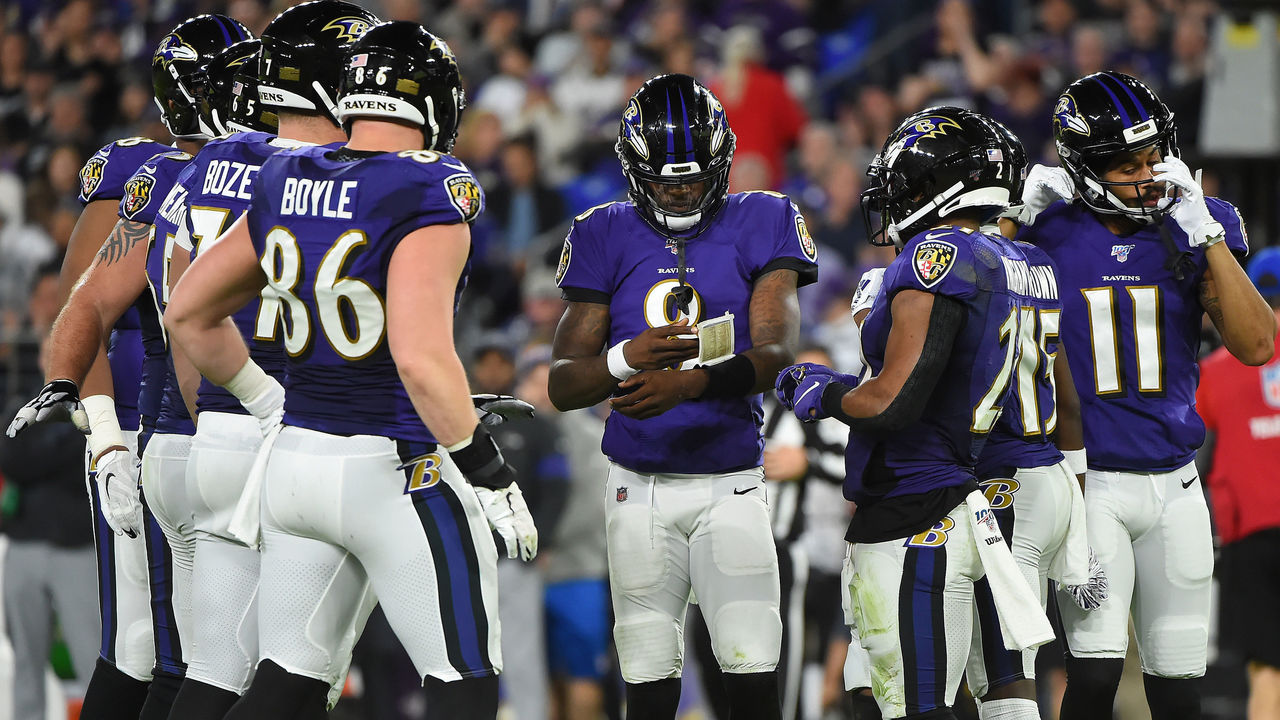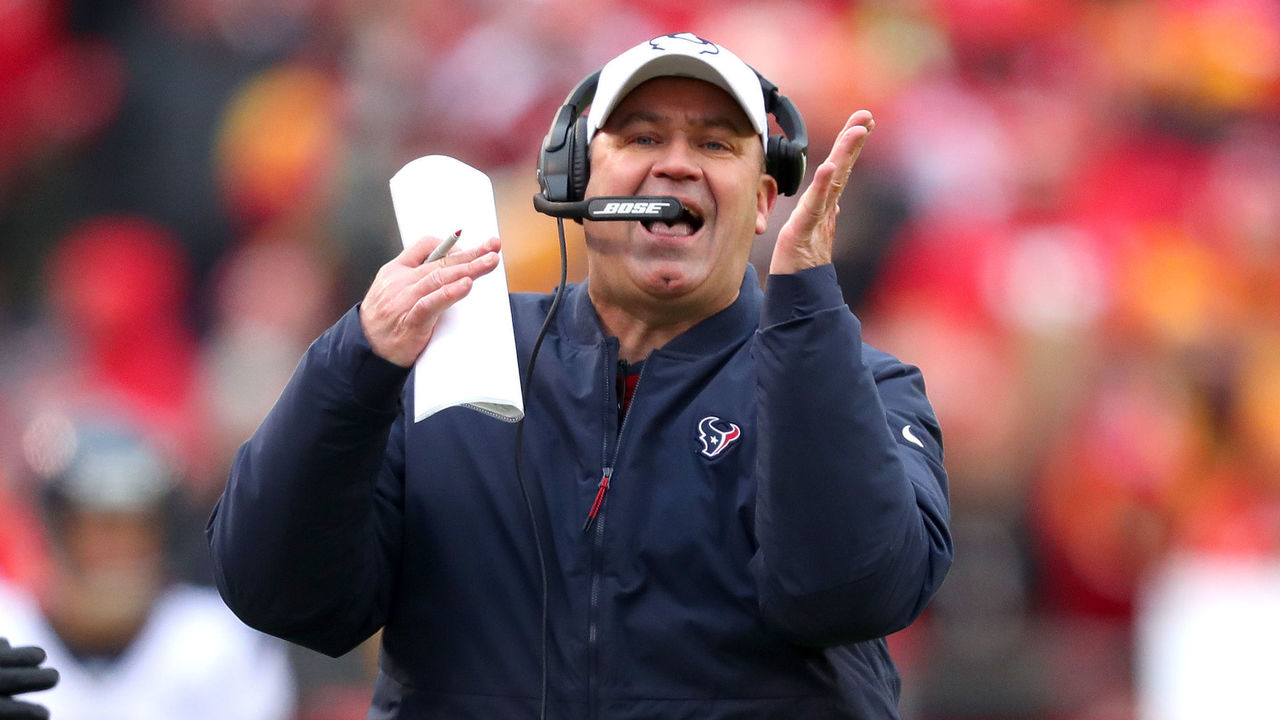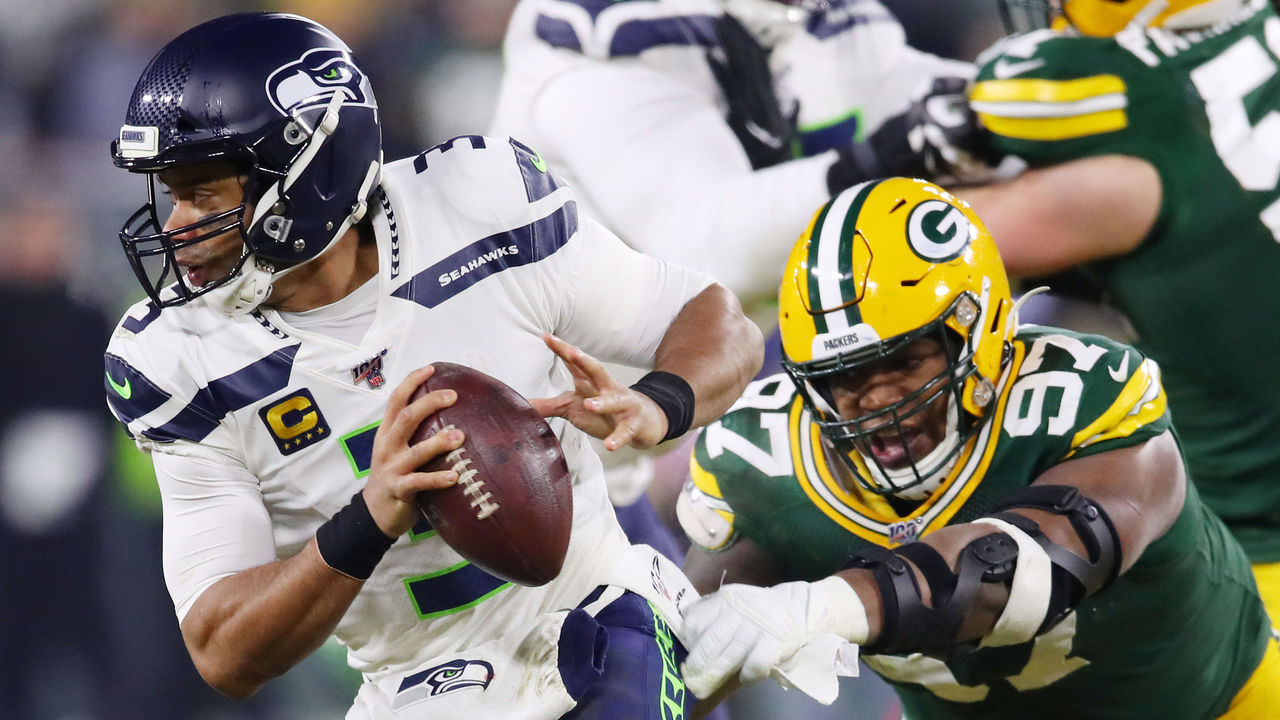8 key takeaways from the divisional round
Sunday Rundown recaps the most important developments from the weekend's action and examines the significance of those events moving forward.
Titans' historic hot streak portends expensive offseason
Win or lose in the AFC title game, the Titans will enter the offseason with very big and likely very expensive holes to fill on their roster.
Playing on expiring contracts, Ryan Tannehill and Derrick Henry have emerged as sudden superstars and almost certainly boosted their respective asking prices to league-high levels. Whether the Titans can afford to keep both - or perhaps the question is whether they can afford not to - will shape the future of football in Nashville.
After toiling away in Miami for seven years, Tannehill's age-31 breakout season is one of the great outliers in NFL history. After taking over for Marcus Mariota in Week 7, Tannehill completed 70.3% of his passes with a league-best passer rating of 117.5, leading the Titans on a 7-3 run and into the playoffs. Now, he's directed two of the most shocking playoff upsets in memory.
It's difficult to quantify a hot streak, but a few key numbers reveal that Tannehill has run hotter than almost any quarterback in NFL history:
- His regular-season average yards per attempt was 9.59, more than a full yard better than the next-best passer.
- Since he became starter, the Titans have scored a TD on 34.6% of their drives (second-most in football) and kicked a FG on just 3.1% of them (32nd), according to FanDuel's JJ Zachariason.
- Thirteen of Tennessee's 31 red-zone TDs under Tannehill came on third or fourth down (including all three against the Ravens). Eighteen of the Titans' 21 red-zone plays on third or fourth down resulted in either a first down or a TD over that span for a rate of 85.7%. In the same situation, the rest of the NFL converted a first down or touchdown only 40.2% of the time, per Sharp Football's Rich Hribar.
Red zone touchdown to field goal ratios over this time period (this is legitimately insane): pic.twitter.com/dILSwBSVTL
— JJ Zachariason (@LateRoundQB) January 12, 2020
All this came after the Dolphins cut the cord on their 2012 first-rounder, shipping him out of town for a swap of late-round picks. The Titans even convinced Miami to pay $5 million - more than half of Tannehill's salary - just to get him off the roster.
Now, Tannehill can reasonably demand a contract in line with the NFL's highest-paid passers, which means more than $30 million annually and at least $100 million guaranteed.
The Titans surely know his production isn't sustainable but must evaluate his small sample and decide how far he can fall back to earth while remaining an effective starter. It's literally a $100-million question.
Henry's hot streak is much easier to quantify. After hitting the 100-yard mark just once in the season's first nine weeks, he's failed to do so only once since then and seized the rushing title with a 211-yard performance in Week 17. Henry was instrumental in both playoff wins, becoming the first running back in NFL history with three straight games of 180-plus yards rushing in the process.
Most rushing yards in a game this season:
— Rodger Sherman (@rodger) January 12, 2020
1. Leonard Fournette, 225
2. Derrick Henry, 211 (Week 17 to clinch a playoff spot)
3. Derrick Henry, 195 (Second round of playoffs)
4. Saquon Barkley, 189
5. Derrick Henry, 188
6. Derrick Henry, 182 (first round of playoffs)
In the span of two months, Henry has transformed from an enigma who the Titans couldn't figure out how to use to someone with a realistic chance to top Ezekiel Elliott's record six-year, $90-million contract if he hits free agency.
Running backs are rarely more productive than on their rookie deals and tend to burn out fast. Rookies routinely contend to lead the league in rushing, and tailback is always the youngest position group at the Pro Bowl. With a fresh crop of cheap talent available in every draft, paying a veteran running back top dollar is seldom the right move.
Ask the Cardinals, who might cut David Johnson less than two years into a three-year, $39-million contract after his production fell off a cliff. Ask the Jets, who are rumored to already want out of Le'Veon Bell's four-year, $52.5-million pact following his disappointing debut in the Big Apple. Heck, ask the Titans themselves how paying Chris Johnson went.
There may be no two impending free agents who will demand more cash than Tannehill and Henry, and there may be none who carry more risk. How severe will Tannehill's regression be? Precisely how special, and how irreplaceable, is Henry, really? How much are these guys actually worth? Which one should be prioritized ahead of free agency?
The franchise tag is certainly in play for the Titans, and a quirk in the collective bargaining agreement could give them a rare lifeline. Normally, teams can use either the franchise or transition tag to keep one player off the open market. This year, with the CBA set to expire at the end of the 2020 season, teams are allowed to designate one franchise player and one transition player.
How does Eric Bieniemy not have a HC job?

As wild as it was to watch Kansas City mount a historic comeback to beat Houston on Sunday afternoon, it somehow wasn't all that surprising. The Chiefs' offense is just that good, and a porous Texans defense certainly wasn't going to be the one to stop them.
The only surprising thing here is that Eric Bieniemy continues to be passed over for head coaching jobs. All openings have now been filled with the Browns reportedly set to hire Kevin Stefanski, and there was no indication that Bieniemy was even among the final contenders for any of them.
The likely excuse, with the Chiefs in the midst of a deep playoff run, is that teams would rather make the hire early and have their new head coach start putting together his staff, as opposed to potentially waiting until the end of the playoffs. But that logic doesn't hold up. Does anyone think the 49ers regret waiting until after Super Bowl LI to hire Kyle Shanahan away from the Falcons?
Getting the right coach for the job should always be the priority, and Bieniemy's resume, which includes three years spent at the helm of the NFL's most explosive offense, is about as impressive as it gets for an up-and-coming candidate.
A smart team is going to be the beneficiary of these oversights at some point in the near future, but it's starting to get ridiculous.
Aaron Rodgers, game manager?
As the Packers head to their fourth NFC title game of the Aaron Rodgers era, the most notable difference from previous playoff runs is the reduced prominence of their franchise player.
Rodgers remains a household name, but the jaw-dropping throws he built his reputation on have never been less crucial to the success of the Packers. The two-time NFL MVP no longer has to carry a team with a suspect defense, toothless running game, and overmatched coaching staff on his back. Instead, the Packers are winning with a strong rushing attack, including Aaron Jones' 20 touchdowns on the year, a surging defensive front, and Matt LaFleur’s intelligent (if not innovative) scheme.
Rodgers is 36 years old, essentially the same age that previous veteran passers like Peyton Manning and John Elway transitioned out of their prime years and into a pure game manager role. They both won Super Bowls with their defenses and rushing attacks doing the heavy lifting, requiring that they only play efficient, opportunistic, and, above all, safe football.
That was largely the model for Rodgers this year. He threw the ball away more than anyone in the league except Tom Brady, led all passers with a 0.7% interception rate, and threw only 26 touchdowns - the fewest of his career in a season in which he stayed fully healthy as the starter. It was the model in Sunday's win over the Seahawks, too, with Rodgers attempting only 27 passes (one more than his career playoff low) while relying on Jones and Davante Adams to make big plays.
Maybe there are a few chapters of vintage Rodgers magic yet to be written, but if he's ever to capture the second ring that eluded him during his playing peak, it will probably happen with his teammates making the impact plays.
Ravens need weapons

Lamar Jackson had his share of miscues Saturday night, but to even think about putting Baltimore's stunning divisional round loss on him would be insane. The soon-to-be MVP did everything he possibly could to put the Ravens on his back, yet even 500 total yards from the star quarterback wasn't enough to will them to victory.
And that's because the Titans, having deployed a masterful defensive game plan while forcing Baltimore into the uncomfortable position of playing from behind, were able to expose something that Lamar's individual brilliance had kept under wraps until that point: the Ravens just don't have many weapons in the passing game.
Mark Andrews and Marquise Brown are promising pieces, to be sure, but the offseason needs to be spent ensuring that middling wideouts like Willie Snead and Seth Roberts aren't next in line for targets. Obvious passing situations wouldn't be so daunting if Lamar's receivers didn't so often force him to make a play for himself.
The good news is the Ravens have numerous ways to address that need. And with so few weaknesses elsewhere on their roster, it seems like a virtual certainty they'll come away with at least one major upgrade at receiver. Using their cap space on a top free agent like A.J. Green, Robby Anderson, or Emmanuel Sanders, and then doubling down in the draft to take advantage of a stacked incoming class of pass-catchers, could make this offense truly unstoppable next year.
49ers' weakness could be at QB
The 49ers are now one game away from the Super Bowl, and nobody who's followed the NFL this year could be even remotely surprised if they go on to win the whole thing. They were far and away the NFC's most dominant team throughout the regular season, and Saturday's drubbing of the Vikings was more of the same.
If there's one thing that should give you pause when considering this team's prospects, though, it's the occasional, yet persistent, lapses we've seen from their leader under center. Jimmy Garoppolo's tendency to throw inexcusable interceptions reared its ugly head against Minnesota and was perhaps the only reason the Vikings hung around as long as they did.
And here's a bit more on Garoppolo's INT issues when looking at win probability. Most QBs with double digit INTs throw a good amount when the game is out of hand. That's obviously not the case with him. pic.twitter.com/J1RjaQFv5G
— Football Perspective (@fbgchase) January 11, 2020
The box score only shows the one interception, and it didn't end up making much of a difference in the end, but it could have been far worse if the Vikings were able to capitalize on more of his bad decisions.
Garoppolo is a perfectly fine player. When you've got a team like the 49ers do - a swarming defense and a football genius in Kyle Shanahan leading the way on offense - you can absolutely win with him. And maybe the 49ers will do exactly that in February.
But needless interceptions, in situations where you have no business forcing dangerous throws, will be all the more costly should San Francisco end up meeting a team like the Chiefs in Miami. Offenses with that kind of firepower getting even one extra possession can make the difference on the final scoreboard. Garoppolo must find a way to make sure he's not the reason the 49ers lose.
Texans' fake punt not to blame, but it didn't help

A lot will be written about the Texans' ill-fated fake punt in the first half of Sunday's stunning collapse. To blame that one play as the sole turning point foolishly minimizes the Chiefs' historic performance - and, especially, the play of the NFL's best player, Patrick Mahomes.
But the gamble certainly played a role in catalyzing everything that followed.
Leading 24-7 and facing fourth-and-4 on their own 31, the Texans lined up to punt before safety Justin Reid took a direct snap, only to be wrapped up just short of the first down. The Chiefs scored a touchdown three plays later, then scored a lot more - including 41 straight points - in their absurd 51-31 comeback win.
Texans coach Bill O'Brien said after the game he felt he couldn't punt too many times Sunday and still win. That's a reasonable position, but then why not leave Deshaun Watson on the field to run the fourth-down play? And if the plan was to be aggressive, why did Houston settle for a short field goal on the previous drive instead of pushing for a touchdown and a 28-0 lead?
O'Brien's poor game management and irrational flip-flopping between conservative and aggressive are major ongoing issues for the Texans. And with O'Brien effectively acting as his own boss in the team's organizational chart, there's no reason to expect anything to change.
Vikings' listless performance was predictable
Clutch Kirk Cousins lasted all of one week, but it wasn't the quarterback who cost the Vikings the game Saturday.
All the ingredients for a letdown performance were there. Minnesota was coming off an emotional overtime upset and traveling to play on a short week (Sunday-Saturday). Its opponents were supremely well-rested coming off a bye and bolstered by the return to health of several key defenders.
Unsurprisingly, the Vikings' energy deficit was immediately apparent at the line of scrimmage. They were dominated on both sides of the ball, producing only 21 yards on 10 rushing attempts a week after Dalvin Cook gashed the Saints, and just one big passing play (during which the DB fell down) as Cousins was relentlessly harassed by Nick Bosa and the 49ers' beastly defensive line.
Rarely is a 14-10 game over at halftime, but this one was. San Francisco smelled blood in the water and called 29 second-half runs, including eight straight on a touchdown drive early in the third quarter that iced the game. In the end, the 49ers' 47 rushing attempts outpaced the Vikings' 45 offensive plays.
The last time a team that played on Wild Card Weekend advanced to the Super Bowl was 2012. A bye to the divisional round is the single biggest advantage in playoff football.
Seahawks' formula doesn't get it done

The Seahawks were a roller-coaster to watch this season. Despite some clear deficiencies on both sides of the ball, particularly in the defensive secondary and on the offensive line, Russell Wilson was able to carry them throughout the campaign.
It reached a point where you couldn't count them out of a game - an epic comeback was always a possibility. And that's where it seemed like things were headed in Sunday night's divisional round game against the Packers, as the Seahawks suddenly got hot and found themselves trailing by just five points in the fourth quarter.
But playoff football, especially when you're on the road against a top opponent, is evidently just a different animal. And as talented as a given quarterback may be, relying on him to make so many off-script plays while everything breaks down in front of him is bound to catch up to you eventually.
Wilson is 10 times the player he was back when the Seahawks were in back-to-back Super Bowls, but with the team failing to get meaningful production out of so many recent top draft picks, the supporting cast is nowhere near as strong.
So while you can never really bet against Wilson, it's still on the front office and coaching staff to give him a better chance in what remains of his prime years. It's about time to start talking about how badly they've been failing on that front.